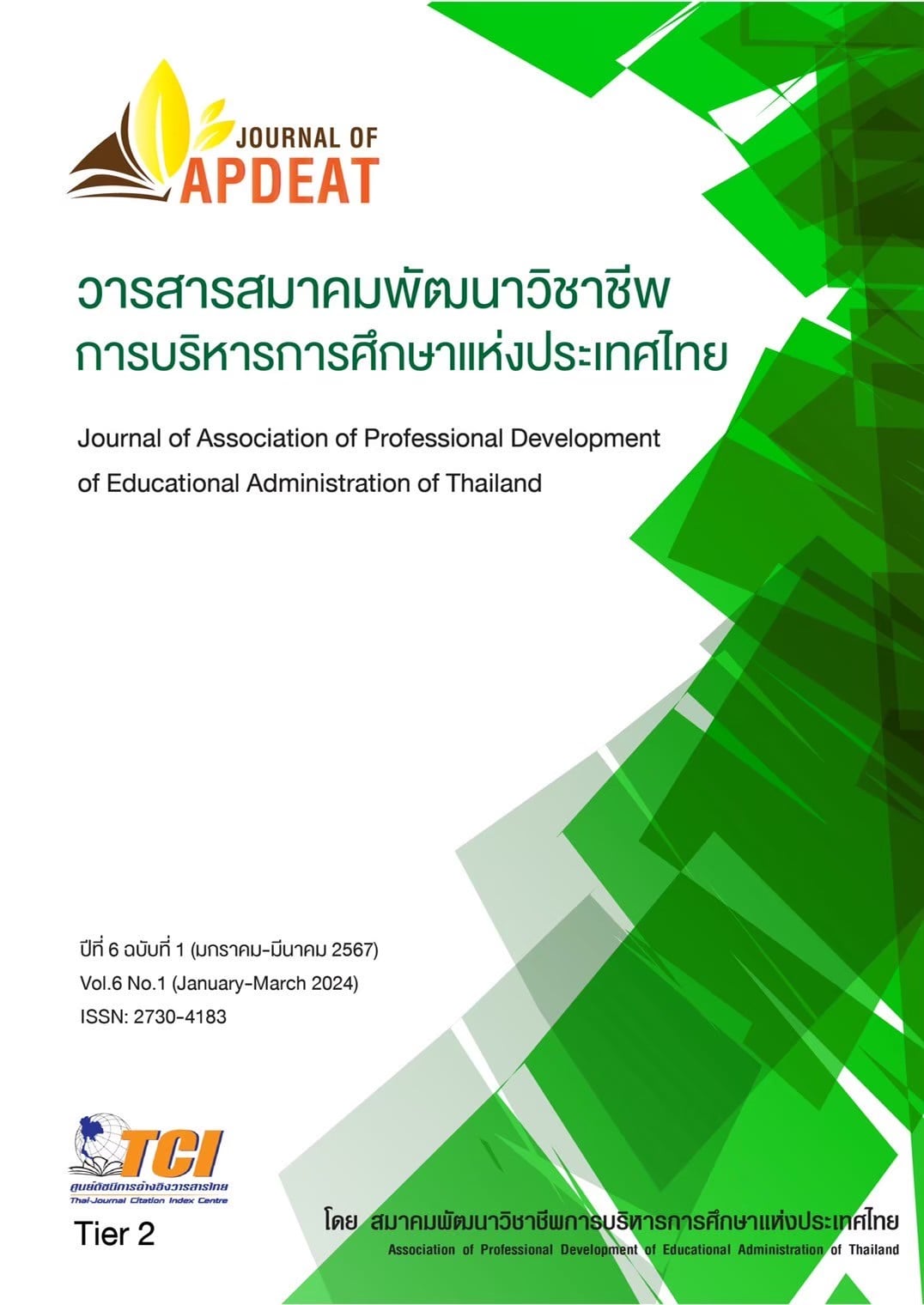กลยุทธ์การบริหารสถานศึกษาในยุคปกติใหม่
Main Article Content
บทคัดย่อ
ในยุคปกติใหม่นี้ การบริหารสถานศึกษาเป็นเรื่องสำคัญที่มีความซับซ้อนและเปลี่ยนแปลงอย่างรวดเร็ว เพื่อให้สถานศึกษาสามารถตอบสนองต่อความเปลี่ยนแปลงทางสังคมและเทคโนโลยีได้อย่างเหมาะสม กลยุทธ์การบริหารสถานศึกษาในยุคปกติใหม่มุ่งเน้นไปที่การรับฟังและปรับปรุงตามความต้องการของผู้เรียนและสถานศึกษาเอง โดยการใช้เทคโนโลยีเพื่อสนับสนุนการเรียนรู้ การสร้างสภาพแวดล้อมการเรียนรู้ที่ให้ความสำคัญกับความหลากหลายและการพัฒนาทักษะการเรียนรู้ และการให้ความสำคัญกับการติดตามและประเมินผล เพื่อปรับปรุงและพัฒนาสถานศึกษาไปอย่างยั่งยืนในอนาคต บทความนี้นำเสนอกลยุทธ์การบริหารสถานศึกษาในยุคปกติใหม่ มุ่งเน้นการใช้กลยุทธ์และแนวทางที่เหมาะสมเพื่อให้สถานศึกษาสามารถปรับตัวและดำเนินการต่อไปในสภาวะที่ผันผวนของโลกในปัจจุบัน โดยเฉพาะต่อการเรียนรู้ และการสื่อสารที่มีการเปลี่ยนแปลงอย่างรวดเร็ว ด้วยการนำเทคโนโลยี และวิธีการสื่อสารใหม่เข้ามาใช้ในกระบวนการจัดการศึกษา เน้นการปรับตัวให้เข้ากับสถานการณ์ใหม่ โดยมุ่งเน้นที่หลักการสนับสนุนการเรียนรู้แบบสัมพันธ์ และการเรียนรู้ออนไลน์ การสนับสนุนและพัฒนาทีมครู การใช้เทคโนโลยีการสื่อสาร การจัดการทรัพยากรดิจิทัลและประสบการณ์การเรียน และการพัฒนาทักษะทางดิจิทัลในนักเรียนและครู เพื่อสร้างการเรียนรู้ที่มีคุณภาพและตอบสนองต่อความต้องการและสถานการณ์ปัจจุบันของผู้เรียน
Article Details
เอกสารอ้างอิง
ณิชา พิทยาพงศกร. (2563). New Normal ของการศึกษาไทยคืออะไร เมื่อการเรียนทางไกลไม่ใช่คำตอบ. (ออนไลน์) (อ้างเมื่อ 18 กุมภาพันธ์ 2567). จาก https://tdri.or.th/2020/05/desirable-new-normal-for-thailand-education/
Abulikemu, A. (2023). The Impact of Covid-19 on Education in Developing Countries. Journal of Education, Humanities and Social Sciences, 10(2023), 21-24.
Burkholder, G. J. and Krauskopf, E. (2023). The Continuing Influence of the COVID-19 Pandemic on Tertiary Education. Higher Learning Research Communications, 13(1), 7.
Edmunds, W. J. (2020). Finding a Path to Reopen Schools During the COVID-19 Pandemic. The Lancet Child & Adolescent Health, 4(11), 796-797.
Fullan, M. (2007). Leading in a Culture of Change. New Jersey: John Wiley & Sons.
Hallinger, P. and Heck, R. H. (1998). Exploring the Principal's Contribution to School Effectiveness: 1980‐1995. School Effectiveness and School Improvement, 9(2), 157-191.
Harris, A. (2002). Effective Leadership in Schools Facing Challenging Contexts. School Leadership & Management, 22(1), 15-26.
Haydee, D. V. (2023). Challenges Encountered by School Administrators During the New Normal Education: A Phenomenological Study. Journal of Education and Learning Innovation, 3(1), 8-16.
Hidayati, A. N., Abdullah, F., Andriani, A., Rosmala, D., and Nurvianti, N. (2022). English Speaking Anxiety Among Indonesian Junior High School Learners: In Search of Causes and Solutions. Getsempena English Education Journal, 9(1), 53-63.
Leithwood, K., Louis, K. S., Anderson, S., and Wahlstrom, K. (2004). How Leadership Influences Student Learning. New York: The Wallace Foundation.
Manila, R. F. and Decano, R. S. (2022). School Administrators' Preparation, Challenges, and Coping Mechanism in the Implementation of Brigada Eskwela in the New Normal. Epra Journals, 9(1), 8-16.
Marzano, R. J., Waters, T., and McNulty, B. A. (2005). School Leadership that Works: From Research to Results. Alexandria, Va. Association for Supervision and Curriculum Development.
Musa, A. and Kwashabawa, B. B. (2022). Classroom Crisis in Higher Institutions of Learning under the New Normal: Administrative Coping Strategies. Journal of Artificial Intelligence, Machine Learning and Neural Network (JAIMLNN), 2(03), 9-16.
Navarrete-Cazales, Z. and Rojas-Moreno, I. (2023). Impact of the COVID-19 Pandemic on the Processes of Internationalization and Virtualization of Higher Education: Antecedents, Current Events, and Possible Scenarios in the Cases of Chile and Mexico. In Internationalization and Imprints of the Pandemic on Higher Education Worldwide, 44, 267-285.
Rusudan, K. and Ana, K. (2023). Analysis of the Impact of COVID-19 on the Educational Process. Šromebi - Sak'art'velos tek'nikuri Universiteti, 2(528), 9-17.
Skinner, N. A., Job, N., Krause, J., Frankel, A., Ward, V., and Johnston, J. S. (2023). The Use of Open-source Online Course Content for Training in Public Health Emergencies: Mixed Methods Case Study of a COVID-19 Course Series for Health Professionals. JMIR Medical Education, 9, e42412.
Spector, B. (2023). Who’s Normal is the New Normal Anyway? A Critical Leadership Appraisal of University Administrators in a Waning Pandemic. Qualitative Research in Organizations and Management: An International Journal, 18(3), 201-221.


